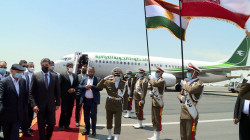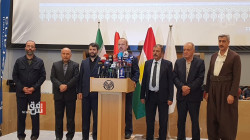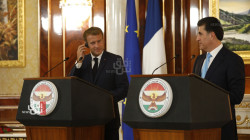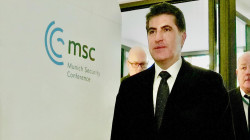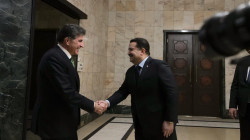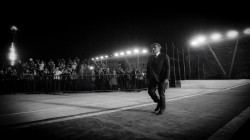Forging regional bonds: President Barzani's diplomatic odyssey in Tehran
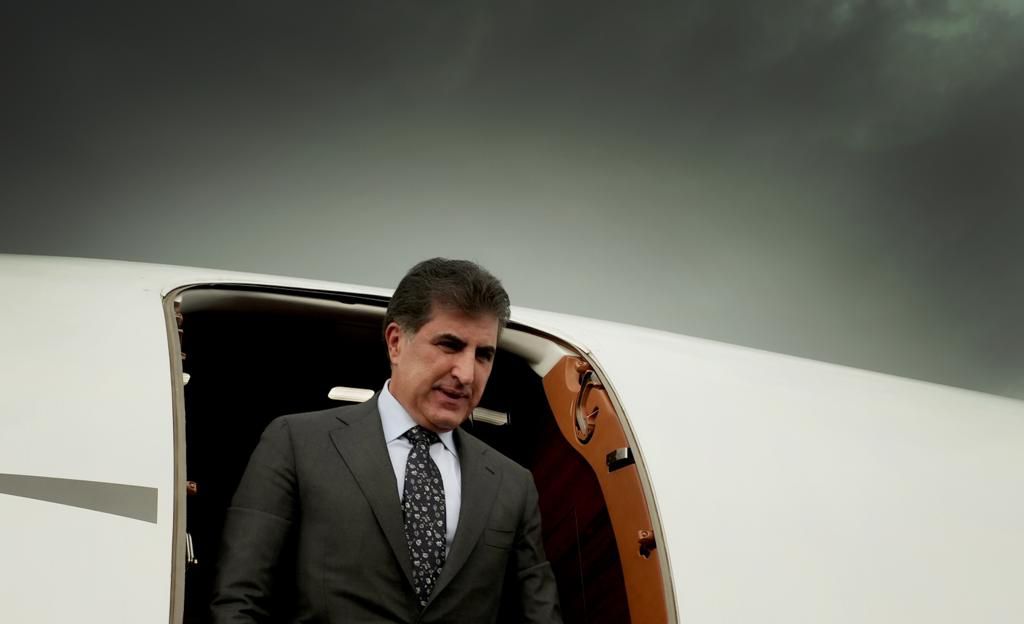
Shafaq News/ President of the Kurdistan Region Nechirvan Barzani recently concluded a series of high-level discussions at the Iranian capital.
This occasion marked President Barzani's fifth visit to Iran in 11 years, emphasizing its enduring significance in fostering robust economic ties, enhancing commercial exchanges, and promoting stability across the region.
The Iraqi government's constructive appraisal of this visit highlights its recognition of its potential to overcome obstacles and resolve longstanding issues between the two sides.
Starting from Saadabad
With his warm demeanor and well-established charisma, Nechirvan Barzani started from Saadabad Palace to engage in pivotal meetings with Iranian leaders.
His agenda included a meeting with Iranian President Ebrahim Raisi, followed by discussions with Ayatollah Ali Khamenei, Iran's Supreme Leader, whose decisions carry significant weight in Tehran's pivotal and consequential matters.
Later, President Barzani held discussions with key figures in the Iranian government, security apparatus, and legislative authority.
During this visit, Dilshad Shihab, spokesperson for the Kurdistan Regional Presidency, conveyed President Barzani's focus on "advancing bilateral relations between Iraq, the Kurdistan Region, and the Islamic Republic of Iran."
Shihab highlighted the historical ties between Iran and the Kurdish forces during the "era of Iraqi opposition and the struggle against dictatorship," underscoring the depth of their shared history.
He emphasized the Kurdistan Region's "commitment to reinforcing stability," stressing the importance of conveying to the Iranian side that it is a "factor for stability, as it has consistently been with all neighboring countries."
Furthermore, he pointed out that "topics of paramount importance during the visit would include the development of relations, reciprocal respect, economic and commercial ties, and regional stability."
The Baghdad-Tehran-Ankara triangle
Nechirvan Barzani's visit to Tehran comes from extensive talks with political leaders in Baghdad, where the Region's President inaugurated a new phase in relations. The visit also follows closely after the "historic" visit of the Turkish President Recep Tayyip Erdogan to Baghdad and Erbil last month.
Barzani's visit to Baghdad lasted for two days (April 27th and 28th, 2024), during which he met with senior state officials, party leaders, and prominent political figures. Discussions concerned various issues concerning the Kurdistan Region, Iraq, and the wider region.
Iraqi leaders highlighted the significance of the visit, seeing it as a breakthrough in resolving longstanding issues between Baghdad and Erbil.
This was Barzani's second visit to Baghdad in April, following the first one on the 5th of the month. In Baghdad, Barzani addressed several crucial topics, including salaries and the budget of the Kurdistan Region, the resumption of Kurdistan oil exports, which were halted since March 2023, the parliamentary elections in the Region scheduled for June 10th, the election of the Speaker of the Iraqi Parliament, as well as the issue of attacks targeting the Kurdistan Region, the most recent of which was the bombing of the Khor Mor gas field in al-Sulaymaniyah governorate on April 27th.
As for the Turkish President's visit to Baghdad and Erbil in April 2024, it marked the first such visit in 13 years. During this visit, President Erdogan and Iraqi Prime Minister Mohammed Shia al-Sudani presided over a quadripartite memorandum of understanding signing ceremony between Iraq, Turkiye, Qatar, and the United Arab Emirates.
In the Kurdistan Region, Erdogan met with Kurdish officials upon his arrival, including a private meeting with Kurdish leader Masoud Barzani.
Nechirvan Barzani bid farewell to Erdogan upon his departure from Erbil and welcomed him at Erbil airport.
Iranian welcome
Iranian political analyst Musaddigh Bor emphasized the significance and warm reception of Nechirvan Barzani's visit to Tehran within Iranian circles, attributing it to the solid relations between Iran and the Kurdistan Region.
Bor noted, "Barzani's personal friendship with Iran, his favorable stance towards the country, and his close connection with Iranian society."
During his conversation with Shafaq News Agency, Bor highlighted that "among the crucial topics discussed during the visit was the economic file as there are good Iranian trade and economic relations with the Region."
"Despite security tensions due to the presence of anti-Iranian groups in some areas of the Region, Bor acknowledged the efforts of both the Kurdistan Region and the federal government in maintaining relative peace and stability, allowing for fruitful economic ties."
Moreover, Bor emphasized the "intertwined nature of security concerns between the Kurdistan Region and Iran," emphasizing "Iran's ongoing engagement with the Region to address security challenges and ensure mutual security and stability."
He also mentioned cultural matters, noting the close cultural affinity between Iranian and Kurdish cultures stemming from a shared root. He suggested that "enhancing cultural cooperation between the two sides, possibly leading to academic and scientific collaboration, is on the negotiation table."
In turn, Iranian political analyst Saleh Zolghadr emphasized the importance of Nechirvan Barzani's visit at any time, suggesting that it "signifies regional shifts requiring consultations between Tehran and Erbil."
Iranian media attention
Nechirvan Barzani's visit to Tehran resonated strongly across Iranian media outlets, receiving extensive coverage and analysis.
A "Mehr" agency report highlighted the role of the Kurdistan Region's President, providing a historical account of his family and their struggle, including his residence in Iran and his proficiency in the Persian language.
The report stated, "With Nechirvan Barzani's visit to Tehran, political interaction between the two sides is expected to intensify." It also pointed out the potential for economic relationship development, which the agency stated would benefit both peoples.
Similarly, the Haft-e Sobh newspaper reported that Nechirvan Barzani's visit comes after nearly three years of fluctuating relations but noted his positive rapport with Tehran.
The report also indicated that Nechirvan Barzani is now taking the initiative to foster reconciliation and expand relations with Iran, signaling a proactive approach to engagement.
Initiative to ensure Kurdistan's security
Political analyst Ahmed Al-Yasiri delineated three foundational pillars underlying Nechirvan Barzani's visit to Iran. Firstly, the security dimension with Barzani's "objective to safeguard Kurdistan's security, particularly concerning the targeting of vital infrastructure and energy sites or direct security threats from Iran."
Secondly, Al-Yasiri elucidated the economic aspect, highlighting the convergence of commercial projects in the region, especially following Turkish President Erdogan's visit. "Barzani seeks to assure Iran that there is alignment between the Regional Government and Baghdad to mitigate security pressures."
Regarding the third pillar, Al-Yasiri addressed the concern over the Kurdish parties. He noted that there is a security apprehension regarding the Kurdistan Region becoming a security concern for Iran, especially in light of confrontations between Iran and Israel.
"Barzani aims to provide reassurances to the Iranian side in this regard, as well as ensure that Turkish intervention falls within the scope of security partnership." He emphasized that "the Development Road project is not a strategic target directed against Iran."
In conclusion, Al-Yasiri suggested that Nechirvan Barzani's visit aims to assuage Iranian concerns, which will have broader implications for Iraqi projects, not solely for the Kurdistan Region.
Baghdad supports the visit
Dhia Al-Nasiri, Foreign Affairs Advisor to the Iraqi Prime Minister, asserted, "the Iraqi government supports any efforts aimed at overcoming obstacles and resolving issues with neighboring countries, particularly with Iran."
He emphasized that the Iraqi government "views Nechirvan Barzani's visit positively, especially given its timing following Iran's targeting of Erbil in January 2024, under the pretext of alleged saboteurs or suspicious facilities affiliated with Mossad."
Al-Nasiri continued, expressing the Iraqi government's "anticipation of the outcomes of the visit."
The President's speech: Forging a new chapter
Following the conclusion of his discussions with Iranian leaders and officials, Nechirvan Barzani expressed in a press conference held in Tehran, "Our visit to the Islamic Republic of Iran was positive and we are confident that it will mark the beginning of a new chapter in the relationship between the Kurdistan Region and Iran."
"Naturally, there are challenges along the way. It is not that these problems do not exist, but what matters is our commitment to resolving them. The Kurdistan Region also seeks to maintain strong relations with Iran, as they are a crucial neighbor who has always assisted us during difficult times."
As per the Regional Presidency, the President continued, "I believe that Iran and the Kurdistan Region are determined to address these issues. The Kurdistan Region's unwavering policy is to be a source of stability and security in the region, and we will continue to uphold this policy."
Regarding the issues between Erbil and Baghdad and the role of Iran in resolving those matters, the Kurdistan Region President said, "We are now embarking on a new phase of our relationship, which necessitates close monitoring. In the event of any difficulties that may arise, it is imperative that we engage in dialogue and foster understanding."
"Over the past few months, we have been diligently working in Baghdad, and we owe our gratitude to the Iraqi Prime Minister, Al-Sudani, for his invaluable assistance in this matter."
"The officials of the Islamic Republic of Iran have consistently expressed their commitment to facilitating an agreement between both parties and resolving any outstanding issues. We have witnessed this dedication from all the officials of Iran, who have proven to be friends to both sides. Their objective is to find a resolution to the disputes between the Kurdistan Region and Baghdad. As a mutual friend, we have naturally sought their assistance in resolving these matters."
Regarding the content of the meeting with the Iranian Leader, the expected visit of the Iranian President to Baghdad, his invitation to Erbil, and the Iranian media's spotlight on his visit to Tehran, President Nechirvan Barzani said, "I had the privilege of meeting the Supreme Leader of the Islamic Republic of Iran, which was a truly remarkable experience. The meeting was highly productive, and I found the Leader to be extremely gracious. It was evident that he strongly supports the Kurds, both in general and specifically in the Kurdistan Region and Iraq," according to the Presidency's statement.
"Unfortunately, I am unable to delve into the specifics of our discussion with the Supreme Leader of the Islamic Republic of Iran. As for the President of Iran, our conversation did touch upon his upcoming visit to Baghdad. I am hopeful that he will accept my official invitation to also visit the Kurdistan Region during his trip to Baghdad. I believe he took this invitation seriously and will carefully consider it in due time, taking into account the prevailing circumstances."
"His response was positive, indicating a willingness to accept the invitation. While I haven't had the chance to review the headlines, it is important to emphasize that the Kurdistan Region plays a peaceful and stabilizing role in the region. This remains one of our top priorities as the Kurdistan Region."
In response to another question about the security situation in the region, President Nechirvan Barzani said, "Several of our meetings have focused on this matter. It is worth noting that we have established a security committee with Iraq, which includes the Kurdistan Regional Government's representative, Rebar Ahmed, who serves as the Interior Minister of the Kurdistan Region. Throughout today's discussions, it was evident that the attendees expressed gratitude for the Interior Minister's efforts in enhancing security."
"However, I would like to emphasize the fundamental principle underlying this. The Kurdistan Region is committed to not posing a threat to its neighboring countries. It is crucial to understand that no armed forces, under any circumstances or name, should enter Iranian territory from the Kurdistan Region and then return to the Kurdistan Region. Such actions are not recognized by international law. This principle applies to our relations with Turkey, Iran, and Syria."
"Our Interior Minister has addressed many of Iran's security concerns on multiple occasions. While there is still work to be done, we are confident that we are on the right path to fully resolving this issue. We hope that all parties involved will comprehend the situation in the Kurdistan Region, and we are grateful that they have already shown understanding. Our hope is that they will continue to grasp the situation and progress towards a resolution. It is important to note that this matter should not be the sole focus of meetings between the Kurdistan Region and Iran."
Regarding the new stage between the Kurdistan Region and the Islamic Republic of Iran, its impact on the political, economic and security situation in the region, and the agreements between Erbil and Baghdad, the President of the Kurdistan Region said, "Several factors and elements arose that led to those concerns. But from my perspective, the crucial point is that few meetings have taken place between the parties involved. Regardless of the challenges faced, holding meetings and applying the mechanisms agreed with Tehran is essential. Problems should be prevented, not put aside and attempts made to resolve them after the event."
"Currently, we have reached an agreement on a mechanism, the details of which I will not delve into here. However, we have agreed in principle on that mechanism, it should be put it in writing, and we agreed on how to implement it. As the Kurdistan Region, this will undoubtedly impact our trade sector, the security of our people, and the movement of citizens between the Kurdistan Region and Iran. These factors hold great significance for us."
"In my meetings in Tehran, both the Kurdistan Regional Government and the citizens of the Kurdistan Region were greatly appreciated for the warm welcome given to pilgrims passing through Kurdistan Region for the commemoration of Imam Hussein in Karbala. When a country experiences such traffic, its economy flourishes, people feel secure, and trade thrives. This mutually benefits both the Kurdistan Region and Iran. It marks a new beginning for us."
"We will establish a fresh agreement and devise a new mechanism to enhance our relations, ensuring that no further problems arise between us in the future."
In response to a question about the demands of the Kurdistan Region and the Islamic Republic of Iran on security issues and more cooperation between Erbil and Tehran, President Nechirvan Barzani said, "Indeed, we also have made requests regarding security matters and these requests will be addressed in the security committee."
"In the meetings, we clearly raised the matters that are causing apprehension for the Kurdistan Region, and these concerns will be discussed also through the framework of the mechanism that I previously mentioned."
"We anticipate that these problems will be resolved amicably, considering our close proximity as neighboring entities. We have the opportunity to foster positive relations with the Islamic Republic in various domains such as culture, higher education, and all other areas."
